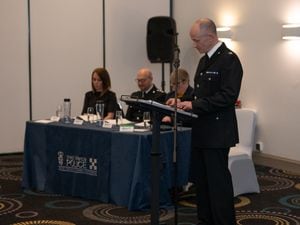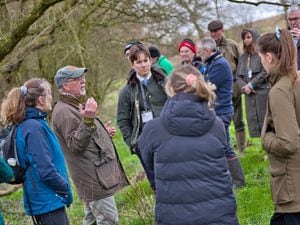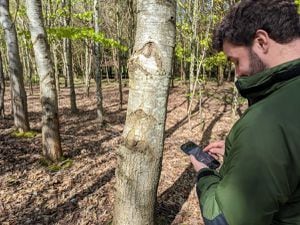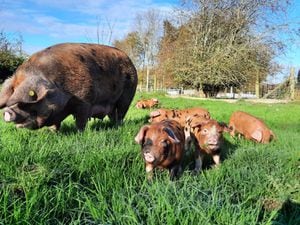Drones from Shropshire could lead the way in fight against coronavirus
Drones from Shropshire's Harper Adams University could be used to disinfect coronavirus hotspots across the country.

Harper Adams, near Newport, has plans to offer drone sprayer training to qualified emergency services drone pilots, to enable them to use spray drones to disinfect against Covid-19.
Agricultural spray drones have been in use for a number of years in countries such as China, India, and the USA.
While European regulations prohibit their use, Harper Adams University is conducting trials, in association with government authorities and other partners, to enable their use for crop protection and weed control within the UK.
China used spray drone systems to disinfect contaminated rural and urban areas in their fight against the coronavirus. They accept that spray drones played an important part in dramatically curtailing the outbreak.
Now the university is waiting to see if Government approval is granted for the scheme to go ahead.
Robert Pearson, director of Chinese Investment Connections, approached Harper Adams University to ask the institution to share their expertise by providing spray drone training to help fight the pandemic.
He said, “I’ve been working in China with XAG, the world’s leading agricultural drone manufacturer. When Covid-19 took effect, they were at the forefront of preventative action in China and have been continuously disinfecting areas there for the past eight weeks. They have sprayed more than 902 million square metres in 20 Chinese provinces with remarkable results.
“I approached Harper Adams as they have extensive experience of using spray drone systems and work closely with both XAG and DJI, and asked them to work with us to develop a rapid solution for disinfecting contaminated areas. Harper Adams's existing collaboration with XAG will be very beneficial in achieving this.
Teams
“A drone can spray 600,000 square metres a day, the equivalent of 100 workers equipped with knapsack sprayers. Not only that, after a drone has sprayed an area, it can return to that area and spray it again fully autonomously with an accuracy of ±1cm repeatedly, meeting the requirement for repeated and regular spraying of key areas.
“In tests carried out in China, a drone spraying disinfectant achieved 99.8 per cent coverage of its targeted area, eliminating all potential for contact contamination of Covid-19.”
Across the UK, there are 48 police drone teams and 100 in the fire service. These teams are specialists in urban flying which is more demanding than rural applications. The plan is for drone and spray experts at Harper Adams University to develop and run an intensive training course for these operators.
This will enable these already qualified drone pilots to operate spray drones to disinfect contaminated infection hotspots, for example parks, areas outside hospitals, emergency and public transport vehicles, and schools.
Jonathan Gill, a mechatronics researcher and drone pilot at Harper Adams University, said there was a number of benefits from using drones in the fight against coronavirus.
He said: “It is possible to operate spray drones remotely, reducing the need for people to enter contaminated areas to disinfect them and their chance of becoming infected. This means that drone operators would not require medical levels of PPE as standard agricultural sprayer PPE would suffice. They would therefore not create an additional burden on the government’s limited supply of medical PPE.
“We’re also looking at using these aerial spray systems to cover areas that are difficult to access with ground based vehicles or hand-held sprayer units.”
There will need to be approval before drone spraying and training can commence. The proposal has been forwarded to the UK government to suggest this as a way forward and discussions are taking place with the relevant regulatory bodies.
Mr Gill said: “Currently we’re working together with the Health and Safety Executive (HSE)’s Chemicals Regulation Division (CRD) to get emergency permissions to spray disinfectants from drones.
“For the past four years, Harper Adams University, together with agricultural drone operators, the HSE’s CRD, and the Civil Aviation Authority (CAA) have been working together to obtain approval for agricultural drone spraying. We’d like to follow China’s successful lead in using drone spraying to tackle the COVID-19 outbreak. They are sharing data on its effectiveness and supporting our efforts.”





